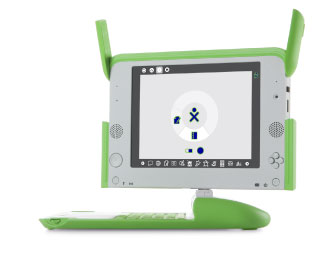 The one laptop per child project really sounds like a great idea. Design a computer that can be mass produced for around $100 each, give them to millions of kids in developing countries, viola! instant smart kids.
The one laptop per child project really sounds like a great idea. Design a computer that can be mass produced for around $100 each, give them to millions of kids in developing countries, viola! instant smart kids.
While there is a lot of value in learning how to use a computer while you are young, most of the true educational value won’t come through the hardware itself. This type of mindset is very common when it comes to technology. People like to focus on the hardware instead of the software. Focusing on what a piece of equipment is theoretically capable of is a lot more exciting than focusing on how you can actually use it today.
In the US educational system, there are many computers. The problem is that teachers are ill equipped to really use these computers as educational tools. Sure, computers are a great way to learn how to type, do research, write papers, etc., but most of the time they are acting as little more than replacements for books, pencils and paper.
Technology is capable of so much more. We should have systems that actively teach kids in an individualized way. Computers should be able to learn how to teach by looking at the results on an individualized level as well as aggregate information about all students.
I like the OLPC project and I really want it to be successful, but technology is only as good as what it allows you to do. Buying a Pocket PC or new desktop computer only helps your productivity if it has software that lets you do more in less time. This is especially true in education.
Gonna have to disagree with you here. Here in America (and the rest of the industrialized world), computers are not necessary in schools. However, in the parts of the world where these computers are meant to be used, many of the schools may have only one or two textbooks to be shared by all students. The computers allow students and teachers to access up-to-date information, educational materials, and, in fact, all kinds of information, that would not be available otherwise.
@Mnementh – So where is this information coming from? I agree that it can be a great tool, but it can’t be used as a textbook unless someone has actually written the materials to be used as a textbook.
It seems to me that getting the content for the textbooks on all the necessary subjects would be at least as difficult as creating the technology for the computer.
I agree that the laptops *could* be very valuable teaching tools, but I think there needs to be more of a focus on the software and content. Right now I think there just just kind of a “if we build it, they will come” approach. This approach doesn’t seem to have worked in the US, so I don’t know that it will work elsewhere.
Have you checked out the software on the OLPC computers? I think that it’s probably pretty useful– lots of software for sharing, creating, exploring ideas and even physical objects.
I oppose extensive computer use in schools. The most significant skill learned in school through through most of college is how to learn. Computers, as used in education today, contribute little to that skill.
As one specific example of the intellectual damage done by computers, the math skills of today’s college graduates are inferior to those of students from 20 years ago (and inferior to the skills of students educated in India and China today.) For the last 10 years, I have been involved in recruiting engineers from some of the best schools in the country. Just as calculators enabled many of my peers to avoid learning basic arithmetic, computers have enabled even engineers to avoid learning advanced math. The loss is not that the students can’t plot points on log-log paper but that their brain never had to figure it out because they could automate their homework without learning how to do it. I’ve seen honors students stumped by the #value# error Excel gives them for trying to force the scale on their graph to be zero.
Computers are a tool for doing something faster than it can be done with a pencil and a piece of paper. Giving them to kids does not improve their ability to think, solve problems or write. More work is needed to develop software and train teachers to use them before we spend a few hundred billion dollars on laptops for children.
I like the “if we build it they will come analogy.” If we build it, they won’t be able to find it with both hands and a flashlight. :)